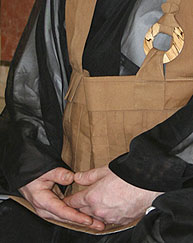The Zen of Fenton
By David Galef, Inside Higher ED, Dec 28, 2007
Mississippi, USA -- At U of All People, Dr. Henry Fenton rose from humble instructor to professor of sociology, then to dean of liberal arts and finally to assistant provost, before retiring.
 Somewhere in the late ’80s, he converted to Buddhism, noting that all higher education was an illusion. His style of administration exuded great calm and judgment and was admired by all except the faculty, the staff and the students. A cardboard plaque outside his former office, paid for by anonymous sources, reads “Zen and Now.”
Somewhere in the late ’80s, he converted to Buddhism, noting that all higher education was an illusion. His style of administration exuded great calm and judgment and was admired by all except the faculty, the staff and the students. A cardboard plaque outside his former office, paid for by anonymous sources, reads “Zen and Now.”
Many on campus who knew the doctor cherish a signal event that touched them, such as the Writing of the Great Memo, which stretched from 1995 to 1999, or the Task Force of Enlightenment, which concluded that all the issues on its agenda would take ten thousand lifetimes to fix.
Others recall the doctor’s dung-colored robe that was given to him by a visiting dean from Tibet, or the “Out” box on Fenton’s desk marked “satori” that was always, miraculously, empty. “Existence is suffering,” he would often intone, “but at least we’re better off than at a state university.” Even those who didn’t care for Dr. Fenton’s ways believe that he raised the art of administration to such heights, it appeared as if he were doing nothing at all.
Once, when inaugurating the construction of a new parking lot by symbolically wielding the first shovelful of dirt, he was asked by a lowly assistant professor, “Tell me, Dr. Fenton, how do you know where to start?”
The doctor scratched his head, looked into the middle distance, and smiled. “Any place where more parking is created will be welcome,” he replied. And with that, he heaved a clod of dirt into the assistant professor’s open briefcase. The assistant professor did not receive tenure, but the parking lot, now named the Henry Fenton Lot of Plenty, is revered by all who park there.
The following are some of Dr. Fenton’s more famous administrative maxims:
What is the sound of a committee with no one serving on it?
Start a study before there’s anything to look at.
Email circles endlessly in the ether.
Tenure cannot outlast death.
Before a meeting of the minds, one must have many prior meetings.
Every spring, the students return to Cancun.
Listen for the session inside the intersession: it is the sound of money.
While the faculty sleep, the pink butterfly wins the grant.
All budgets are an illusion.
To administer from home: this is contentment.
If we do not give ourselves raises, who will?
Walking along the path of rightness, here comes the provost.
Every graduation, the quad needs re-sodding.
The building of buildings acquires greater merit than the increase of faculty salaries.
Graduation is the beginning of all fund raising.
New curricula, new problems.
We are all disciples of the chancellor.
Academic scandals pass, and new ones take their place.
The wisdom of Miyazaki-sensei is useless unless he publishes his research.
Dean Ueda finally hung up on the irate alumna. The silence filled his office like a balm of nectar.
The Dean of Student Affairs is not what you think.
One foot in administration is two feet inside.
The art of saying no also involves saying yes and maybe.
The university is a universe unless it loses its accreditation.
Even a large donation cannot buy happiness. It can, however, purchase a new athletic facility.
-----------------
David Galef is a professor of English and former administrator of the M.F.A. program in creative writing at the University of Mississippi. His latest books are the novel How to Cope with Suburban Stress and the co-edited fiction anthology 20 over 40.

 Somewhere in the late ’80s, he converted to Buddhism, noting that all higher education was an illusion. His style of administration exuded great calm and judgment and was admired by all except the faculty, the staff and the students. A cardboard plaque outside his former office, paid for by anonymous sources, reads “Zen and Now.”
Somewhere in the late ’80s, he converted to Buddhism, noting that all higher education was an illusion. His style of administration exuded great calm and judgment and was admired by all except the faculty, the staff and the students. A cardboard plaque outside his former office, paid for by anonymous sources, reads “Zen and Now.”